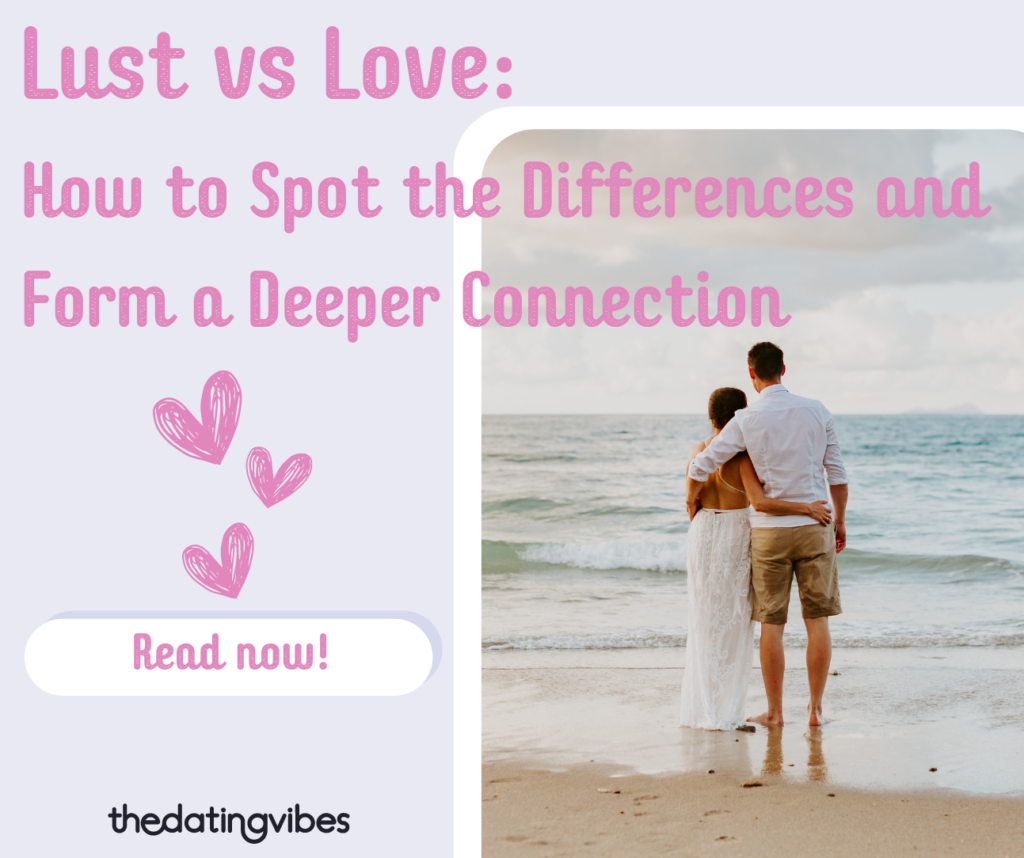Lust vs. Love: How to Spot the Differences and Form a Deeper Connection

I’ve seen it so many times in my practice. Someone sits across from me, eyes wide with excitement—or maybe filled with anxiety—wondering, “Is this real love, or am I just caught up in the moment?”
Lust and love often get mixed up. Both spark intense emotions and attraction, but while lust is fast and thrilling, love is deep and lasting. Understanding the lust and love difference helps build relationships with clarity.
You might also be wondering, “How long does lust usually last?” Generally, lust is temporary—fading anywhere from a few weeks to a couple of years as the initial excitement subsides. If your emotions grow deeper over time, it may be a sign that real love is developing.
Let’s break it down together and find out what is love and lust.
What Is Lust?
Lust is a strong sexual attraction to another person that we feel when we first become a couple. When it works well, lust can serve to facilitate a strong physical connection between two people. What does lust feel like and what are the most visible signs of this feeling?
- A person’s emotions are exclusively sex-related
- Losing of attraction after discovering a partner’s imperfections
- Admiration for a person’s physical beauty
- An overall need for sexual closeness
- No motivation to develop a more meaningful relationship
💡 As a psychotherapist, I often remind my clients that lust is a natural and important part of attraction, but it alone isn’t enough to sustain a long-term relationship. Understanding the difference between temporary desire and deeper emotional connection can help individuals make healthier romantic choices.

What Is Love?
Love is an intense feeling of longing and attraction to another person for life. This feeling makes people feel a deep affection towards someone and a strong desire to care for this person. Look at the list below to recognize the signs of love:
- Feeling the desire to learn more about the person
- Prioritizing spending time together
- A strong longing to care and make the partner happy
- Feeling a deep affection and commitment
- Desire to plan a common future
💡 I always repeat that love goes beyond emotions—it’s about building trust, respect, and fostering a deep emotional bond. True love is not just about how you feel in the moment but how you support and grow with each other over time.
The Difference Between Lust and Love
Now that you’re aware of the love and lust meaning, it is high time to discuss the main differences between these two notions. Love vs lust? Take a look at the key distinctions in the following table.
| Lust | Love |
|---|---|
| Focusing on sexual desire | Giving priority to emotional connection |
| Finding the person’s appearance attractive | Appreciating partner’s inner world |
| No interest in becoming closer | Feeling the need to know more and care |
| Losing an attraction after noticing drawbacks | Acceptance of a person’s imperfections |
| No further plans with a partner | Desire to plan a common future |
As you can see, the distinction between love and lust is in general apparent, though confusing feelings may sometimes appear. Is it love or lust? The next differences presented in more detail will help to make things clear.

The Feelings You Have
It is considered that the primary distinction between lust and love is a feeling. A strong sense of affection and commitment toward another person might be a sign of love. The intensity of the emotion causes the person feeling love to develop a strong emotional bond quickly. Lust, on the other hand, might be felt as intense sexual attraction and nothing more.
Interest and Desire to Care
Love implies having a strong interest in a partner’s character, habits, preferences, and everything connected to them, while lust typically entails an overwhelming desire for sexual activity. People who are in love want to take part in their soulmates’ lives and make them happy, while those having lust only aren’t interested in showing care to the person.
Wish for Future Commitment
When feeling bare physical attraction, the person might not feel the need to commit right away and develop plans together. However, while being in love, you might think about expressing your emotional dedication and taking responsibility. It is obvious that you will have a desire to make plans for the future and learn more about your companion at this period.
Time of Appearing the Feeling
In most cases, people need more time to develop a profound connection with someone. Love often requires spending time together, sharing thoughts, and finding common ground to start feeling an emotional connection. At the same time, lust might happen more quickly, and that’s why it is frequently confused with love at the beginning of a relationship.
The Science of Lust vs Love: What’s Happening in Your Brain?
Your brain is a gripping thing. It actually has different systems for lust, attraction, and attachment.
- Lust is driven by hormones like testosterone and estrogen, which make you crave physical closeness and intimacy.
- Attraction triggers dopamine and norepinephrine, which gives you that heart-racing excitement when you see someone you desire.
- Love (or long-term attachment) relies on oxytocin and vasopressin, the chemicals that create deep bonds and emotional security.
Lust is short-lived. Love requires time, shared experiences, and trust. If your relationship is built purely on attraction without a deeper connection, it may not have the foundation for lasting love.
Can Lust Turn Into Love?
Everyone can imagine going from friendship to lust. However, many people wonder: Can lust turn into love? It is quite possible that a lust relationship subsequently develops into a more meaningful feeling as two people become closer, learn more about one another, and connect on a deeper level.
However, although it is proven that lust can develop into love, relationship experts caution that experiencing lust does not ensure falling in love. The following signs indicate the person gets more strong feelings:
- Starting to feel an emotional connection
- Desire to spend more time with the person
- Feeling the longing to get to know the partner better
- Acceptance of his possible drawbacks
- Feeling safe and peaceful while being together

In my years as a therapist, I’ve seen all kinds of relationships.
One client, Emily, came to me confused. She had been seeing someone for six months, and the passion was undeniable. But outside the bedroom, she realized they had nothing in common. The emotional connection wasn’t there. She had mistaken lust for love.
Then there was Michael, who started his relationship purely based on attraction. But over time, he and his partner shared deeper conversations, learned to trust one another, and built something meaningful. What started as lust evolved into lasting love.
So, what is the difference between love and lust? Emotional depth. Shared values. Commitment beyond just passion.
Limerence: The Infatuation Phase That Tricks Us
Before we wrap up, did you know there’s another state that often gets mistaken for love? It’s called limerence, and it’s more than just lust—it’s an intense infatuation that can feel overwhelming.
Many people have never heard the word “limerence,” but I see it all the time. Limerence is that head-over-heels infatuation where your thoughts are completely consumed by someone. It’s the butterflies, the late-night texting marathons, the feeling that you just can’t get enough of them.
Limerence feels intoxicating, but it’s not necessarily love. It’s your brain releasing dopamine—lots of it. This can make you feel euphoric, obsessive, and even anxious if the other person doesn’t respond the way you hope. Unlike love, which deepens over time, limerence often fades once reality sets in or the emotional highs become exhausting.
How do you know if you’re in limerence rather than love? Ask yourself:
- Do I know this person deeply, beyond the surface level?
- If the thrill faded, would I still want them in my life?
- Am I more attached to the fantasy of them than who they really are?
If you’ve ever felt consumed by someone but later realized you didn’t truly know them, you were likely experiencing limerence rather than love. Recognizing this can help you understand your feelings better and make healthier relationship choices.
Limerence fades, usually within a few months to a couple of years. Love, if it’s real, grows stronger over time.
Conclusion
Love or lust? This question is crucial while creating a meaningful relationship based on trust and devotion. Now that you can differentiate between love and lust feelings, it should be easier for you to identify the real motives of your partner and better understand yourself before developing genuine bonds.
FAQs
A profound emotional connection that surpasses physical attraction is the sign of love. Instead, if emotions are exclusively sex-related, the person feels lust over love.
It is hard to say how long does lust last before it passes into the stage of love. Although each situation is personal, the average duration of this phase of a relationship is two years.
Yes, the signs of lust are a strong physical attraction, admiration of a person’s appearance, and a need for sexual closeness. The signs of love include feeling profound affection, the desire for emotional closeness, and a common future.
Yes, love and lust coexist in a healthy relationship, where people experience physical attraction and have a strong emotional connection at the same time.
It is considered that lust is part of successful relationships and love is the logical continuation of it. Based on this, the presence of lust doesn’t interfere with a meaningful connection.



